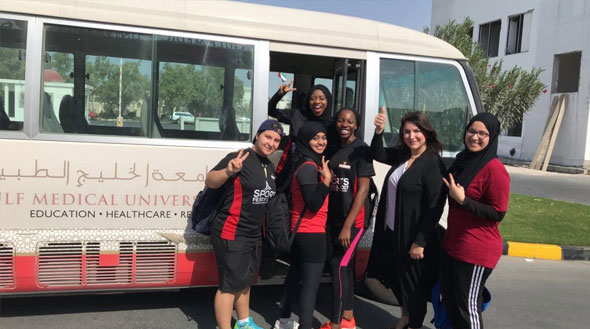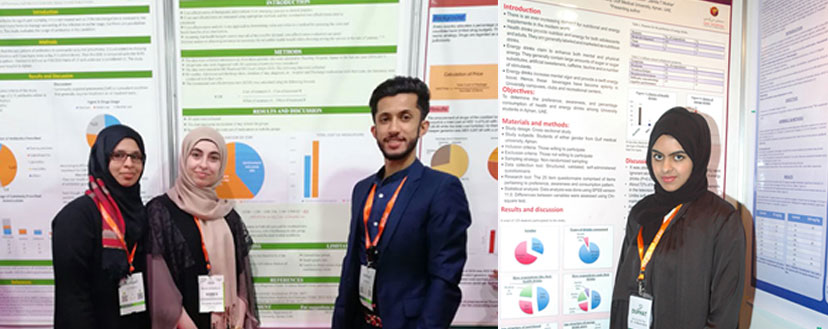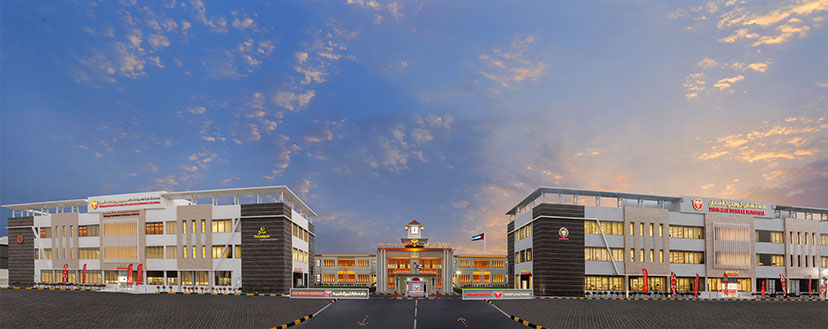With over 300 staff, 1600 students and campus building and networking hospitals and facilities, the University’s activities have a significant environmental impact. The Maintenance and Facilities team is responsible for managing the environmental initiatives to help us reduce any negative impact by strict monitoring of utility consumption, optimal resource utilization to ensure longer useful life of the assets and high resource efficiency. The University is committed to Environmental sustainability, which is embedded in the goals, values and strategic objectives of GMU. To support this, the university maintains a team of facility maintenance professionals with a provision in the University annual budget.
Environmental Sustainability at GMU

GMU reflects its commitment to sustainability through its Vision “To be a leading international Academic Healthcare Institution through the integration of quality health professions education, research, healthcare and social accountability for sustainable community development” and Mission “To pursue excellence through integration of health professions education, translational research, quality health care, innovation and social accountability enhanced by national, international partnerships and community engagement”
- Provide authentic educational opportunities for all categories of health professional students, preparing them to successfully pursue postgraduate training and continuous professional development.
- Develop leaders in healthcare services who can respond to the fast-growing global healthcare needs of the country and region.
- Advance scientific knowledge through research and discovery in the fields of biomedical sciences, population health, healthcare systems, and Medical Education.
- Improve primary to tertiary health care in UAE and GCC region through its ‘Academic Healthcare System, Hospitals, Clinics and Centers of Excellence’.
- Emphasize GMU social responsiveness and community engagement by providing affordable quality health care for different sectors of the community and promoting a healthy lifestyle.
Sustainable growth is one of the Drivers of our Strategic Plan 2017-2022
- Provide a hybrid of sustainable ‘Incremental or breakthrough improvements to current trajectory of programs’ and disruptive innovation technology (to produce simpler, affordable, accessible online learning) allowing expansion beyond geographical constraints
- Social Accountability and community outreach.
- Strategic Partnerships (national, regional & international) for sustainable development.

GMU is committed to environmentally friendly waste management through a proper collection of waste at its point of generation and disposal of waste as per Municipality norms. We encourage reuse and reduction of waste generation to the maximum extent. We ensure optimal utilization of resources such as classrooms, lecture halls, labs, etc. through a well-designed resource tracking system. GMU sustainability Model (People Planet & Profit – PPP) is consistent with the mission and vision of the university to ensure that the organization recognizes and delivers effectively its responsibilities towards society and environment while focusing on its objectives. Planet related objectives are achieved through compliance with environment-friendly waste management, adopting paperless practices and systems and effectively monitoring utility consumption.
Periodic inspection is in place to ensure optimal consumption of water and electricity, periodic checking & analysis of generator smoke and water quality by the maintenance team to ensure an overall safe environment. We have a dedicated biomedical engineer to ensure all lab equipment are purchased, operated and maintained as per the international norms of sustainability.
We use timers on the lab equipment that don’t need to be left overnight, or during specific periods of time throughout the day. The benefits of this is a reduction in energy consumption, cost, environmental impact, and often increase in the useful life of the equipment. Fume hoods use a tremendous amount of energy hence are open only when being actively used.
We encourage sustainable transport system so as to achieve the objectives for reducing congestion, improved air quality and reduced carbon emissions. GMU’s transport department is committed to providing quality transportation by maintaining the highest level of safety, outstanding customer service, and positive employee relations. The team comprises of experts in the areas of safety, training and development, vehicle maintenance, routing, and public relations. This makes us confident in providing exceptional services to our students, staffs & guests, Training and Development is our core strength and helps deliver the highest quality of services.
The transport department has taken many initiatives to improvise the overall service performance by implementing key parameters in-line with standard operating procedures such as:

- Driver Recruitment Assessment –Theory & Practical Sessions
- Driver Performance evaluation card
- Accident management
- Driver Training & Development
- Fleet Performance evaluation
- Fleet Service Log Book
- Route Planning, implementation & map sharing
- Shuttle Services
- Transport Portal Services
- Risk Management matrix
- Awards and accreditation
The majority of total energy use and CO2 emissions in the vehicle lifecycle occur during the use stage. There are big differences in the degree to which vehicles achieve their inherent environmental performance because of the way each person drives those vehicles, so awareness of “eco-driving” is an important issue. Eco-driving has the effect of reducing CO2 emissions through improved fuel efficiency, while it also contributes to fewer traffic accidents. We have put forward ten concrete action goals for our Drivers which enables them to quickly begin driving in environmentally considerate ways:
- Accelerate gently
- Maintain a steady speed and keep your distance
- Slow down by releasing the accelerator
- Make appropriate use of the air conditioner
- Don’t warm-up or idle your engine
- Plan itinerary to avoid congested routes
- Do 4-Point Check prior to the journey – tire air pressure, radiator, coolant, service due’s
- Reduce load
- Respect traffic rules & regulations
- Check readings on fuel efficiency monitoring equipment

Labs involve higher costs of building and operating than other classrooms, lecture halls, and office buildings. Further labs consume higher energy than other areas. The Lab In-charge of all labs ensures that all equipment is turned off in unoccupied rooms. All equipment is periodically inspected as per the guidelines for lab maintenance guidelines. All labs have well-defined lab waste disposal policy. Lab waste is disposed off through an outsourcing agency in strict compliance with the Ministry of Health (MoH) rules & regulations. Labs and other campus facilities are monitored 24/7 by the security and maintenance teams with CCTV cameras. Lab temperatures are adjusted appropriately in winter and summer to save energy. Lab equipment can be very energy intensive, particularly fume hoods and devices are used to maintain hot or cold environments. Labs and its equipment are monitored as per the international guidelines. We are committed to protect our environment by being up to date on less toxic chemical alternatives and implement sustainable chemical practices at our labs. Some of the best practices we follow at our labs are
- Liquid nitrogen conservation is an important energy efficiency measure because the production of LN2 is an energy-intensive Treating liquid nitrogen (LN2) cell storage containers like a freezer, minimizing the amount of time the door is open, decreases the amount of LN2 that boils off.
- Most frequently accessed samples are stored near the top of the rack so that they can be accessed without compromising the temperature stability of other samples on the rack, and without letting a lot of LN boil off.
- Freezer map and inventory are posted on the lid of the freezer and a logical storage system is maintained to minimize time with door open trying to find samples.
- Lid seals are checked on a regular basis to ensure that it shuts properly.
GMU offers courses like Master in Public Health and Master in Environmental Health & Toxicology. Master of Public Health has been designed to meet the ever-increasing demand for healthcare professionals to plan and implement innovative Public Health Schemes and Programs at regional, national and international level. The objective of the course is to strengthen the Public Health system, and train and develop competent public health educators, researchers, practitioners, administrators, managers, and policymakers.
Master in Environmental Health & Toxicology provides theoretical and practical knowledge in Environmental Health & Toxicology, seeking to determine the nature and mechanism of adverse effects of chemicals such as those found in industry, in the household, in agriculture, in medicine and those that occur naturally in the environment. Also, graduate students are familiarized with a diligent and systematic inquiry or investigation into a subject in order to discover or revise facts, theories, and applications for the benefit of the society.
The Research conducted by the Master students in Environmental Health & Toxicology mostly address the environmental issues of the local community. Some of the projects are listed below.
| Completed Research Projects | |
| Sl. No | Title of the Research |
| 1 | Estimation of blood lead levels and hemoglobin concentration in children aged between one and five years |
| 2 | Assessment of toxic heavy metal contents in herbal cough syrups dispensed in UAE community pharmacies |
| 3 | Estimating arsenic levels in the rice available to consumers in the UAE |
| 4 | Estimation of heavy metals and caffeine in honey using atomic absorption and gas chromatography with mass spectrometry |
| 5 | Investigation of Phthalates content in commonly used perfumes and deodorants in UAE |
| 6 | Quantitative assessment of toxic heavy metals and metalloid content in cosmetics |
| 7 | Estimation of sibutramine and phenolphthalinein in different slimming products by GC/Mass |
| 8 | Heavy Metals in Hair and Nails as Markers of Occupational Hazard among Welders working in UAE |
| 9 | HPTLC analysis of phthalate esters in commonly available edible oils packaged in plastic containers in UAE |
| 10 | Estimation of Lead, Cadmium and Arsenic in commercially available fish using atomic absorption spectrophotometer |
| 11 | Estimation of Ochratoxin A in Coffee beans and its association with coffee bean characteristics |
| 12 | Analysis of phthalate esters in different baby care products available in UAE |
| 13 | Estimation of Bisphenol A leaching levels from drinking water bottles stored indoor and outdoor |
| 14 | A Correlation study on blood and erythrocyte lead levels with hematological changes in preschool children |
| 15 | Estimation of urinary metabolites of Benzene, by Gas Chromatography-Mass Spectrophotometry (GCMS), in the occupationally exposed population |
| 16 | Estimation of Bisphenol A and Bis-2-ethyhexyl phthalate exposed to food simulants from microwavable plastic containers |
| Ongoing Research Projects | |
| 1 | Influence of p53 inactivating mutation and the effect of the pharmacological restoration of functional p53 on cell cycle arrest in breast cancer |
| 2 | Estimation of Bisphenol A in the soil of solid waste landfill areas in UAE |
| 3 | Investigating the expression of intratumoral chemokine involved in immune cell recruitment in hypoxic breast cancer |

We encourage our students to participate in community outreach projects under the supervision of our faculty members. Our Community Medicine department is committed to helping the aspiring students to conduct research in various aspects of health and to present their research in the national and international scientific forum.
As part of the commitment to the society, faculty along with undergraduate and postgraduate students conduct health campaign and many outreach educational activities every year. The university has a dedicated community engagement committee, in which 2 members nominated from the local community to facilitate us in better understanding about the community needs and assess its impact.


We encourage healthy, well-balanced and sustainable catering through our campus cafeteria. We ensure that our food items are purchased and processed under conditions that favor friendliness with the planet, animal rights and benefit the entire community. Our hospitality division manages our cafeteria and restaurant to offer the healthy and well-balanced food for our staff and students. We adopt practices to save cooking fuel by using energy efficient techniques. We also ensure maximum reduction of food waste.
Figure: Our President, Dr. Thumbay Moideen Felicitated for Contribution to Community Awareness Program

The Founder, President Board of Trustees of Gulf Medical University has quoted that “We consider reaching out and giving back to the society as an integral part of our corporate culture”. We have a dedicated CSR committee which oversees the CSR activities and programs at the corporate level. The committee has successfully carried out several CSR programs at various parts of the country, promoting causes and activities benefiting low-income groups, women, children, various professional groups etc. Free Medical and Dental health camps for the public led by Gulf Medical University teaching hospitals and clinics are a regular activity conducted under the committee’s guidance and supervision, benefiting thousands of people, especially blue-collared workers. The committee also facilitates scholarships and financial assistance for academically bright and financially backward students desirous of pursuing health profession education as a part of Corporate Social Responsibility.
The Corporate Social Responsibility (CSR) Committee of University had launched the ‘Joy of Giving’ initiative to support needy children and bring happiness to their lives. The month-long campaign launched under Thumbay Foundation, the charitable arm that supports the CSR activities of the corporate Group, formally started on 21st July 2018 encouraged people to donate books, toys, clothes, school stationaries and painting materials for needy children and orphans.
We source only from authorized agencies, dealers or distributors of well-established brands in the market. All our suppliers are registered and approved by the local regulatory bodies. Compliance with International quality standards such as ISO, CE, FDA etc. are taken into consideration during supplier/product selection. Our best practices include
- We substitute reusable products whenever it is possible. For disposable products, we consider products with reduced or recycled content packaging.
- We also encourage using end-of-life take-back programs, centralize chemical purchasing and keep our inventory up-to-date.
- We always verify energy efficient options with our vendors, while purchasing a new appliance. In case of absence of any such options, we encourage our vendors to supply more sustainable products at a competitive price.

It is without question that one of the most important aspects of safe construction is Sustainability which describes our desire to execute construction activities without depleting resources or inviting harmful impacts. We ensure significant commitment to careful consumption of resources. We also demonstrate a commitment to safety by having a strong corporate safety policy, we also develop “site-specific safety plans” tailored to meet the needs of the specific projects. We further have a dedicated Quality Assurance/Quality Control program which is reviewed and updated frequently in order to maintain the highest standards of quality in construction.

- We have received 5-star ratings from QS (One of the leading global university ranking organizations) for environmental sustainability and Inclusiveness and 4-star ratings for facilities.
- We have received the prestigious Sheikh Khalifa Excellence Gold Award and Dubai Quality Appreciation Award for inculcating international best practices in Institutional Quality.

About Us
- About GMU
- Vision & Mission
- Organization Chart
- Thumbay Group President
- Office of the Chancellor
- Office of the Vice Chancellor Academics
- Office of the Vice Chancellor Research
- Board of Trustees
- University Advisory Board
- Quality Assurance & Institutional Effectiveness Unit (QA&IEU)
- Accreditation and Ranking
- Careers@GMU
- Environmental Sustainability
- Partner with Us
- News
- Photo Gallery
- Video Gallery
- Location Map
- Contact Us

